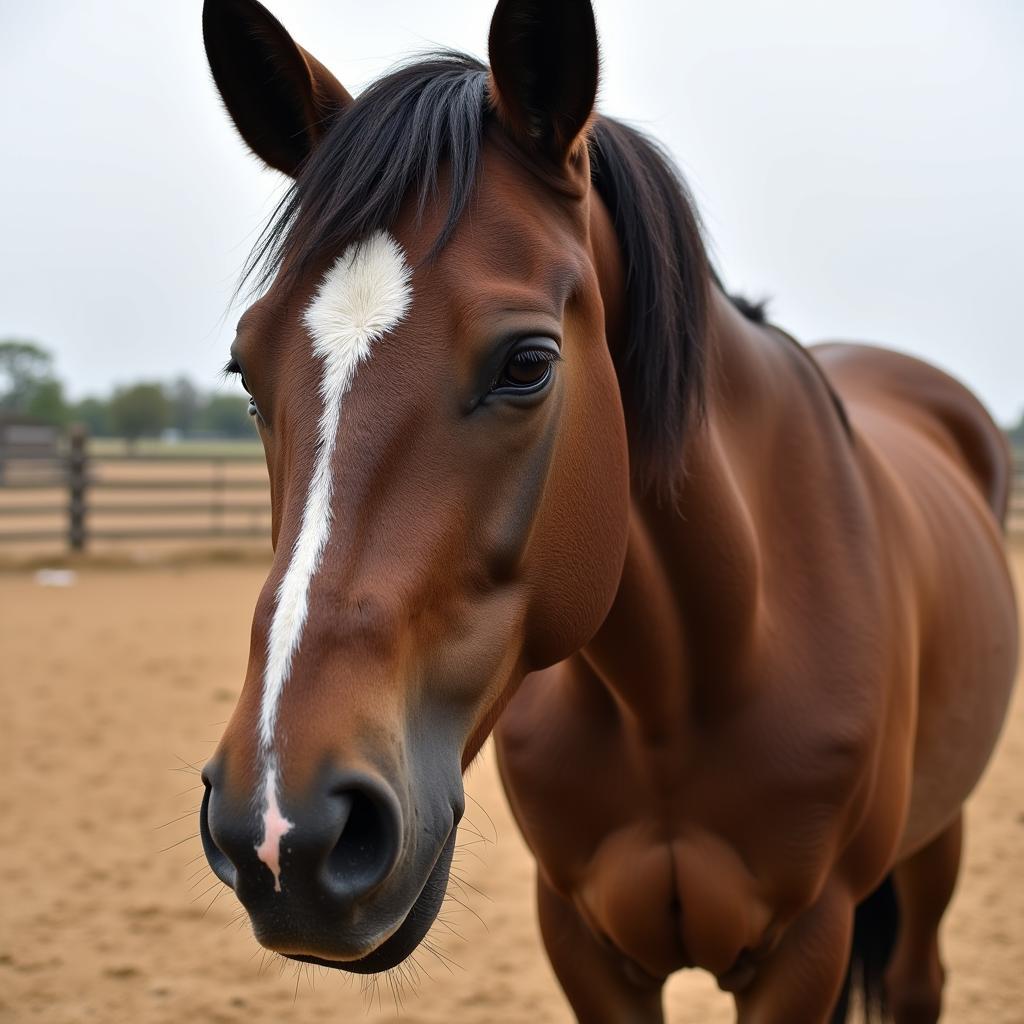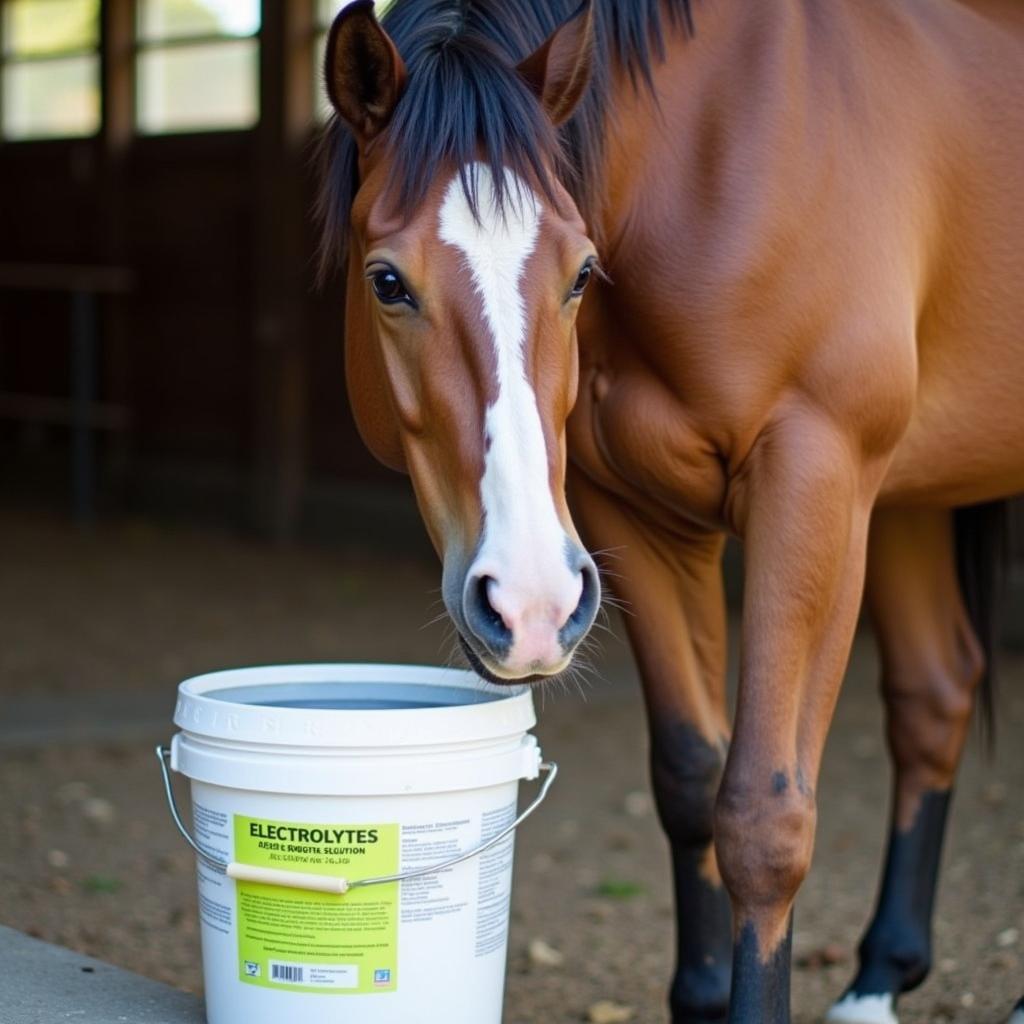Keeping your horse properly hydrated is crucial for their health and performance. A horse’s water intake can vary depending on factors like workload, weather, and diet. Finding the right Thirst Quencher For Horses means understanding their needs and providing access to fresh, clean water at all times.
Understanding Your Horse’s Hydration Needs
Horses, like all mammals, require a significant amount of water daily. Dehydration can lead to serious health problems, including colic and heatstroke. A horse’s water requirements can fluctuate, increasing with exercise, hot weather, and lactation. A good rule of thumb is to provide at least 5-10 gallons of water per day, but this can easily double in demanding conditions.
Factors like the type of feed also play a role. Horses on dry hay or grain require more water than those grazing on fresh pasture, which has a higher water content. Observe your horse’s behavior and manure consistency to assess their hydration status. Dark, dry manure can be a sign of dehydration.
Signs of Dehydration in Horses
Knowing the signs of dehydration is crucial for early intervention. Some common indicators include lethargy, sunken eyes, dry gums, and decreased urination. In more severe cases, horses may exhibit an increased heart rate and capillary refill time. If you suspect your horse is dehydrated, contact your veterinarian immediately.
 Dehydrated Horse Showing Signs of Thirst
Dehydrated Horse Showing Signs of Thirst
Providing the Best Thirst Quencher for Horses
Simply offering water isn’t always enough. You need to ensure it’s palatable and accessible. Here are some tips for providing the best thirst quencher for horses:
- Clean Water Sources: Regularly clean water troughs and buckets to prevent the buildup of algae and bacteria. Dirty water can discourage horses from drinking enough.
- Water Temperature: Horses generally prefer cool, not icy, water. During winter, consider using heated buckets or troughs to prevent freezing. Conversely, in the summer, ensure shade is available to keep water cool.
- Salt and Electrolytes: Adding electrolytes to water can encourage drinking, especially after strenuous exercise or during hot weather. Salt licks also provide essential minerals and stimulate thirst.
- Multiple Water Sources: Providing multiple water locations, especially in larger pastures, can ensure all horses have easy access.
- Water Quality: Have your water tested regularly to ensure it’s free of harmful contaminants that can affect your horse’s health and willingness to drink.
 Horse Drinking Electrolyte Water
Horse Drinking Electrolyte Water
What About Flavored Water?
Some horse owners experiment with adding flavorings like apple juice or molasses to water to encourage picky drinkers. While this can be helpful in some cases, it’s important to introduce new flavors gradually and monitor your horse’s reaction. Some horses may have digestive upset with certain additives.
Conclusion: Prioritizing Your Horse’s Hydration
Providing a reliable and palatable thirst quencher for horses is a fundamental aspect of equine care. By understanding your horse’s individual needs and following these tips, you can ensure they stay properly hydrated and healthy. Remember, fresh, clean water is the best thirst quencher for horses and is vital for their overall well-being. horse quencher
FAQ
- How much water should a horse drink per day?
- What are the signs of dehydration in horses?
- How can I encourage my horse to drink more water?
- Can I add flavorings to my horse’s water?
- What type of water trough is best for horses?
- How often should I clean my horse’s water trough?
- Is it okay to give my horse ice water?
Common Thirst Quencher Scenarios for Horses
- The Picky Drinker: If your horse is a picky drinker, try offering different types of water containers, such as buckets, troughs, or automatic waterers. You can also experiment with adding flavorings, like apple juice, to the water.
- The Horse That Doesn’t Drink Enough During Travel: Ensure your horse has access to water during transport and offer water frequently during breaks. You can also bring water from home to help maintain familiarity. flying horse beer vs taj mahal
- The Horse That Sweats Excessively: Horses that sweat heavily will require more water. Ensure they have access to plenty of fresh, clean water and consider adding electrolytes to their diet.
Further Reading & Resources
- Visit our blog for more articles on horse care and management.
- Check out our product page for a selection of high-quality water troughs and buckets.
For further assistance, please contact us at Phone Number: 0772127271, Email: [email protected] or visit our address: QGM2+WX2, Vị Trung, Vị Thuỷ, Hậu Giang, Việt Nam. We have a 24/7 customer service team.